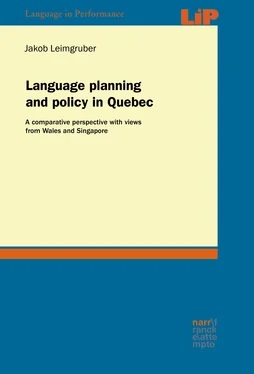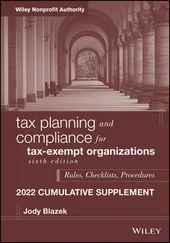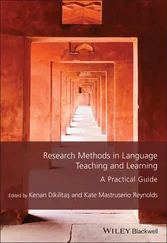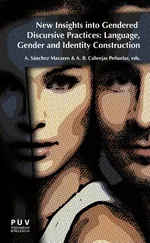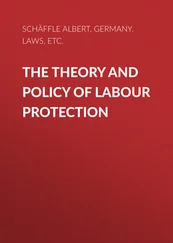2.3.3 The English language in Quebec: use, form, regulation
English has been in use in Quebec for a very long time. Even before the 1760 Conquest, English-speaking settlers were present in the territory of what is now Quebec. Under British rule, anglophone immigration became more pronounced, in a succession of waves of different origins: the United Empire Loyalists, American colonists wishing to remain loyal to Britain during and after the Revolution War (1775–1783), moved northwards into Canada (primarily to Nova Scotia and New Brunswick, but also Quebec and Ontario); Boberg (2010, 62ff) puts the total number in the vicinity of 100000 immigrants, 7000–8000 of whom settled in Quebec. A second wave of migration occurred in the aftermath of the Napoleonic Wars and the ensuing post-war recession, so that over several decades after 1815, a large number of immigrants from the British Isles crossed the Atlantic in search of a better life (both in Canada and the United States). The Irish Potato Famine (1845–1849) was another factor in encouraging emigration. The numbers were high, as reported in Boberg (2010, 70), who quotes the numbers of 109680 departures from British ports to British North America and 142154 departures to the United States from Cowan (1961, 288), although this number includes non-anglophone Europeans, such as the high number of Germans that made the journey via British ports (Boberg, 2010, 70–71). The majority of this migration landed in the city of Québec, and, after the deepening of the Saint Lawrence waterway in the 1850s, also in Montreal. Boberg (2010, 73–74) also cites statistics from Elliot (2004, 62), which see the Irish as the dominant group (58 %) recorded at Québec in the period 1816–1824, followed by immigrants from Scotland (30 %) and England (13 %). Not all of these migrants remained in the province, but those who did certainly did have an impact on the linguistic ecology there.
The variety of English spoken in Quebec is, unsurprisingly, not very different from other Canadian varieties of English (for an overview of Canadian English as a whole, see e.g. Boberg 2004b; Boberg 2010; Chambers 2006; Dollinger and Clarke 2012b; Dollinger 2015; Dollinger and Fee 2017). In fact, while some scholars postulate a distinct variety ‘Quebec English’ (notably Boberg 2012, also Fee 2008), others, such as Poplack (2008) and Poplack et al. (2006), refuse to accord it the status of a variety in its own right. What is clear is that, as Boberg puts it, English in Quebec ‘is a minority language in every sense’ (2012, 493), both numerically (with native speakers being a demographic minority in the province) and politically (with the language policies in place aimed at preventing its furtherance). Poplack (2008, 189) also directly imputes this minority status to the language legislation in place, in combination with the ‘Anglophone exodus’ (Castonguay, 1998, 41), the migration of anglophone Quebecers out of the province in the wake of the Quiet Revolution. While all these factors may indeed contribute to the definition of Quebec English (or ‘English in Quebec’) as a minority language, it bears repeating that Anglophones have always been a minority demolinguistic group in the province (although at a time at a much higher rate of some 25 % in 1851, and with the exception of the city of Montreal, which in 1851 had a 55 % majority anglophone population, see Boberg 2012, 495), so that in a way, English has always been in the (numerical) ‘minority’ in Quebec. However, since it is the case that language policy has resulted in English losing some of its more overt political power in the province, and given this new sociolinguistic status in combination with its permanent status as the language of a numerical minority, it stands to reason to expect there to be some form of linguistic effect on the English spoken in the province, primarily, of course, in the form of influence from the majority language, French.
These influences, ‘gallicisms’, as Boberg (2012) calls them, are found at the phonetic, lexical, and grammatical levels. At the level of accent, differences between Quebec English and other varieties of Canadian English are small and limited to the vowel system: Boberg (2008) mentions the vowel /ɑː/ in words like car and start , which, when travelling from British Columbia to Newfoundland, is increasingly fronted to reach almost [ɐ] in Newfoundland (Boberg, 2008, 143). This trend, however, does not hold for Quebec, where the vowel is closer to [ʌ], and very distinctively different from the neighbouring Maritimes as well as Ontario. A similar observation can be made about Quebec’s status with respect to Canadian Raising. This feature, stereotypical of Canadian English as a whole, affects the closing diphthongs /aɪ/ and /aʊ/ when occurring before voiceless consonants, whereby the starting point is raised to varying extents ([ɐ], [ʌ], or even [ə]) (Chambers, 1973). This results in words like about and price being pronounced as [əbʌʊt] and [pɹʌɪs]. Of course, ‘Canadian Raising’ is neither restricted to Canada (Vance, 1987; Britain, 1997; Dailey-O’Cain, 1997), nor is it systematic in all of Canada (see also Labov et al. 2006): Quebec (together with Newfoundland, but unlike the neighbouring Maritimes) stands out for its lack of raising, therefore resulting in a distinct dialect region at least as far as this feature is concerned. Boberg (2010, 209) calls Quebec an ‘interstitial region of uncertain status between Ontario and the Maritimes’, both of which show typical features of Canadian English. His explanation is that the Maritimes and Ontario are similar because of a shared history of permanent Loyalist settlement, which Quebec lacks.
At the lexical level, the number of French loanwords in the putative Quebec English has received some attention (see e.g. Manning and Eatcock 1982; McArthur 1989; Grant-Russel 1998; Fee 2008). Boberg distinguishes items that are due to the official status of French in the province, resulting in governmental bodies being referred to by their French names, even in otherwise English discourse. While this applies particularly to newsreaders and the print media, examples such as cégep ‘senior high school’, from the French acronym for Collège d’enseignement général et professionel , are being used by most of the Anglophone population without second thought, much like other abbreviations such as SAQ (pronounced [es eɪ kjuː]) for the Société des alcools du Québec , the provincial liquor board.1 Other examples of lexical transfer come from the party political landscape, such as péquiste ‘ Parti Québécois supporter’, from the provincial education system, as in garderie ‘daycare’, maternelle ‘kindergarten’, and the cégep defined above. Further examples listed by Boberg (2012, 497) include allongé ‘espresso coffee with extra water’, gallery ‘veranda’, terrasse ‘patio restaurant’, cash ‘checkout, till’, dépanneur ‘corner store’, and tisane ‘herbal tea’. The mention of poutine , the term for the Quebec delicacy of French fries with gravy and cheese curds (derived from the English word pudding ), is also listed by Boberg as a ‘Gallicism [that] has no English equivalent’, with the appropriate caution that it has spread beyond Quebec into all of North America, and is, therefore, not restricted to Quebec English.
Boberg goes on to give a list of semantic changes that occurred in the putative variety of Quebec English that may be derived from French influence: animator ‘children entertainer or meeting leader’, delay ‘amount of time given before a deadline’, and formation ‘education’. Influence is also seen in preposition use ( to abuse of something ), phraseology ( corner as a calque on French coin to mark road intersections, e.g. ‘we are on St. Catherine, corner St. Laurent’), and verb phrases ( pass functioning like French passer , as in ‘I will pass to the bank on the way home’).
Читать дальше
